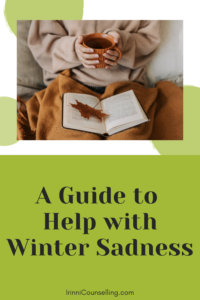
A Guide to Help with Winter Sadness
You might have heard about winter sadness and wondered whether it is a real thing – well it totally is and it’s more commonly known by the name seasonal affective disorder, or SAD for short.
How does winter sadness affect people?
In the UK, as autumn leaves begin to fall from the trees, in roll dark mornings and dark evenings, particularly after the clocks change at the end of October.
Many people are now getting up and traveling to work or education in the dark, and it’s often dark by the time they leave or get back home.
This lack of daylight can leave some people feeling sad, experiencing low mood, or a lack of energy. And perhaps, just longing for the light and warm summer evenings they recently enjoyed.
However, the impact of winter sadness should not be underestimated. It is thought that seasonal affective disorder affects around 2 million people across the UK and can be a real struggle for some people to cope.
How to cope with winter sadness
As a type of depression that comes and goes in a seasonal pattern, there are several things you can do yourself to boost your mood and reduce the effects of seasonal affective disorder over the winter months.
Get out in the morning daylight
Even on grey cloudy days, it’s important to get out in the first light if you can, even something as simple as standing in the garden to drink your cuppa.
This can help ‘reset’ your internal body clock – your circadian rhythm, which will set you up for the day ahead.
Your circadian rhythm helps control and trigger multiple processes in your body, from digestion to sleep, and keeping it in sync will help you stay physically and mentally well.
Let the light in
If you spend most of the day indoors, at work, or home, try to let as much natural light into your environment as possible. Open curtains or blinds as soon as it begins to get light and sit by a window if you can.
If you’re at work during the day and experiencing seasonal affective disorder, speak to your manager about working nearer to a window, or taking regular breaks to get outside. Your employer should seriously consider any requests to support your mental wellbeing at work.
Use a SAD lamp
Light therapy helps to ease symptoms of depression in those who are affected by seasonal affective disorder and involves using a specially designed artificial light to replicate the effects of sunlight during the darker winter months.
SAD lamps, or lightboxes, are readily available online to buy. 10,000 lux is ideal (that’s a measurement of the brightness) and you can get UV-free ones if you prefer.
Most lightboxes are portable so could easily be taken with you if you are staying away from home.
Related blog post: Making the Most of Christmas When You Feel Down
Consider Vitamin D supplements
Another good winter boost is Vitamin D, a fat-soluble vitamin that assists many processes in the body to function well and can help to regulate mood, so it’s important that we get adequate levels.
We can get vitamin D2 from foods such as oily fish, beef, eggs, cheese, and mushrooms, but not vitamin D3.
The body produces vitamin D3 when it is exposed to sunlight, but in the UK, we just can’t produce enough vitamin D3 through the winter months, so a supplement can be helpful from autumn to spring.
Get to bed earlier
Sleep is vital for mental health and emotional wellbeing, but can really help with low mood during the dark months.
Centuries ago, people would have risen with the sunrise and settled down at sunset, getting more sleep throughout the winter.
If you find yourself sitting up until late watching mindless tv, snacking on foods you’d rather not eat, whilst keeping the heating on longer – you could try hopping into bed that bit earlier and enjoy the extra rest until spring comes around.
Know that this time shall pass
It’s important to view the levels of energy we have in a cyclical way that change as the seasons change, and understand that these dark nights will pass and summer will come again.
It’s ok not to feel the same as you did in summer. Use the dark evenings to snuggle up on the sofa with a book and some soft lighting instead – and drizzly weekends are perfect for crafting, watching movies, or playing board games with loved ones.
Struggling to shake off the winter sadness?
Sometimes no matter what you try it just feels like the dark cloud of sadness won’t lift.
You’re not alone if you feel that way, and I’m here to support you.
You can book psychotherapeutic counselling sessions with me and we can work through your problems together.
I work in an integrative and holistic way, looking at the whole person, mind, body, and soul so that you get tailored support to help you thrive.
Contact me here to chat through your options.
